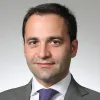Celebrate that EU safe assets have joined the €1tn club
Kalin Anev Janse, ESM Chief Financial Officer
“Celebrate that EU safe assets have joined the €1tn club”
Op-ed published by the Financial Times, 26 March 2024
A significant milestone has been reached this month. There are more than €1tn of European safe assets in the market issued by the European Commission, the European Investment Bank and the European Stability Mechanism plus the European Financial Stability Facility. The number has almost doubled compared to 2014, the aftermath of the eurozone crisis.
With the elections to the European parliament coming up in June, numerous ambitious policy ideas are being floated. The French and Estonian heads of state, for example, have called for the issuing of joint bonds to fund defence spending. Former European Central Bank president Mario Draghi has spoken about huge gaps in competitiveness and public goods.
Funding such ambitions nationally might not be feasible, as countries need to consolidate their public finances to make room for investment and to protect themselves against future shocks. Financing public goods via European institutions might be easier, as recent history has shown. The EU is still disbursing from the €800bn Next Generation EU-Covid package. The EIB issues €60bn a year. The ESM currently has a lending capacity of €422bn. These are large numbers.
A key advantage is that these triple A-rated bonds are backed by European sovereigns. With higher interest rates, we have seen international investors regain interest in the euro. Europe has built a strong financial architecture, which has helped it to remain unaffected by the banking turmoil that occurred in the US and Switzerland last year.
Economically, Europe is also doing better than many expected, even though growth is forecast to remain rather weak. Finally, due to quantitative tightening, there are simply more European assets in the market. We have seen the most active primary market in 15 years at the start of 2024.
Investors are more upbeat about Europe than in the past. In 2024, a total of 40 per cent of ESM/EFSF bonds have been taken up by central banks, governments and sovereign wealth funds. Twenty-six per cent of this issuance was taken up by Asian investors. Overall, these are the highest numbers since 2011, when the EFSF first started issuing bonds.
As this June’s elections loom, the question of how to finance European public goods is becoming unavoidable. In the past, we have seen that a joint response has yielded positive results. The common monetary and fiscal response to the eurozone crisis calmed markets.
The joint response to the Covid crisis, the initial €540bn ESM/EU/EIB response and Next Generation EU, combined with the ECB’s pandemic emergency purchase programme, helped contain bond spreads.
Greece and Cyprus, supported by European packages from the ESM and others during the crisis in the eurozone, have regained investment grade status from the big rating companies and are now attractive for financial markets again. The Baltic states have also seen their spreads tighten, despite the initial widening that occurred at the start of the war in Ukraine in 2022.
The €1tn club is also a significant contributor to the capital markets union. Back in 2021, the ESM introduced the five S’s, game changers for Europe’s capital markets: supervision, securitisation, SME finance, sustainable finance and, most importantly in this case, safe assets.
This tells us that when Europe acts together, it is able to convince the world and markets. Ahead of those important June elections, it is good news for European policymakers that support for the euro is at an all-time high and the requisite financial institutions are in place. A joint response to big geopolitical challenges boosts Europe’s role in the world.
Financial Times: Celebrate that EU safe assets have joined the €1tn club
Author

Contacts


